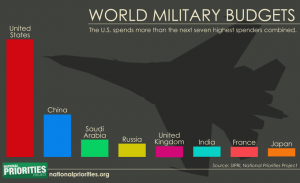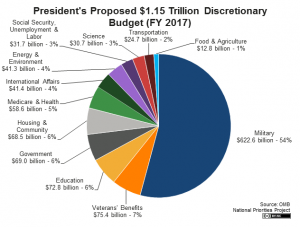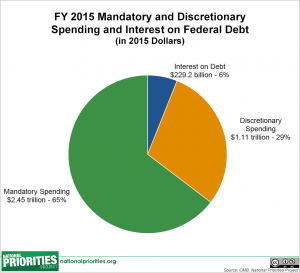By Carol Hanisch
Absent from most of the debate in the presidential primaries is the discussion of the military budget and the wars that have secured profits for the rich while carrying out killing fields abroad and dying fields at home.
Even Bernie Sanders, whose “needs of the 99%”–centered platform of universal health care, free college tuition, improved Social Security and such doesn’t talk about the voracious tiger shark in the room: the overwhelming size of the military budget. Sanders proposal to tax Wall Street simply isn’t enough to meet all our needs, though it would go a long way, and his lame proposal to cut the waste out of the military budget isn’t going to do it either.
Meanwhile, Hillary Clinton “has not met a war she doesn’t like” as several writers have put it. Regime change not only means death and misery abroad, it means death and misery “at home”—and not just of soldiers. Programs that could extend and improve our lives go under- or unfunded. Feminist, too, have a dog in this fight. Demands for everything from universal childcare and eldercare to programs with productive jobs necessary for ending prostitution and pornography cannot ultimately be met without being publicly funded. Currently most such programs are limited and/or indirectly funded though foundations by corporations in pursuit of their own agenda.
Then there’s Donald Trump talking out of both sides of his mouth, claiming he will “make deals” instead of sending in the troops, while at the same time “making America great again” by building up a stronger military. As if the U.S. military weren’t ridiculously “strong” already—spending more than the next seven highest countries combined—and as if U.S. workers weren’t already being robbed to pay for it.
As President Dwight Eisenhower pointed out in a 1953 speech:
Every gun that is made, every warship launched, every rocket fired signifies, in the final sense, a theft from those who hunger and are not fed, those who are cold and are not clothed. This world in arms is not spending money alone.
It is spending the sweat of its laborers, the genius of its scientists, the hopes of its children.
The cost of one modern heavy bomber is this: a modern brick school in more than 30 cities.
It is two electric power plants, each serving a town of 60,000 population.
It is two fine, fully equipped hospitals. It is some 50 miles of concrete highway.
We pay for a single fighter plane with a half-million bushels of wheat.
We pay for a single destroyer with new homes that could have housed more than 8,000 people.
This, I repeat, is the best way of life to be found on the road the world has been taking.
This is not a way of life at all, in any true sense. Under the cloud of threatening war, it is humanity hanging from a cross of iron.
Eisenhower made this speech several years before he famously warned in 1961 in his presidential farewell address about the dangers of the military-industrial complex, which had begun to happen under his watch. The National Priorities Project provides a modern update to some of these trade-offs here:
* * *
It shouldn’t have to be said that a country and a world produce only so much wealth, but some seem to think it is bottomless. If that wealth is blown on the military, the population pays a serious price. Just how much the U.S. spends on the military is unknown, since full disclosure is not required. This chart by the National Priorities Project of the 2017 proposed budget gives some idea. Just to be clear, note that this is for “Discretionary Spending” (the part of the budget allocated annually by Congress that includes much of the military spending). There is a “non-discretionary” part of the budget that contains items, like Social Security, that are separate as they are more or less permanent and are revisited only periodically. Below it is the chart of the total budget.
“Of the discretionary spending total, $622.6 billion, or 54 percent, would be set aside for the Pentagon, nuclear weapons and related items. The next biggest category of discretionary spending would be veterans’ benefits, receiving an additional $75.4 billion. These two categories total nearly 61 percent of the total discretionary budget. The remaining 39 percent would fund education, housing and community programs, science, the environment, and more.”
Below is the chart of the total of both the mandatory and discretionary spending. It should be remembered that not all military spending is disclosed.
More charts and explanations are available at National Priorities.* * *
Historically, the anti-war movement in the U.S. ebbs and flows. Although the reasons for it are contested, the election of Nobel Peace Prize recipient Barack Obama as commander-in-chief saw the huge movement that blossomed against the War in Iraq under George W. Bush come to a virtual end. Since then we have had invasion after invasion with unending war eating up our taxes and our security.
The people of the U.S. and other imperialist countries have to realize, however, that we too benefit from imperialism, it’s not just the rich. We have access to all kinds of goods from food, clothes, electronics, and all kinds of other “stuff” at lower prices because workers abroad are paid much less than corporations have to pay for even the poorest paid production jobs in the U.S. The U.S. also uses its power to extract the natural resources of other countries, often at the point of a gun. I recall one Vietnam Vet saying it was “worth it” to keep gas cheap so he could run his motorcycle. So we end up in an untenable position of being both exploited and exploiters. Fairness in wealth distribution looks much different and more complicated if one looks beyond our borders.
Kollibri terre Sonnenblume ties this together and reminds us that war threatens the planet itself:
The material and financial wealth of the United States is not produced without cost: it is extracted from the global environment in processes that require much suffering and destruction. Every dollar in the US economy represents exploited labor, degraded ecosystems and the viability of the future being sacrificed for profit in the present.
The US pie is 20% of the world’s resources being consumed by 5% of the world’s population. According to the Pew Research Center, “on a global scale, the vast majority of Americans are either upper-middle income or high income. And many Americans who are classified as ‘poor’ by the U.S. government would be middle income globally.” Using data from the World Bank and the Luxembourg Income Study database, Pew notes that by world standards, only 2% of Americans are poor, 3% low income and 7% middle income. Fully 56% of the US population is in the top bracket, “high income,” with the remaining 32% being “upper middle.”
The Pew study adds that “the majority of Americans are part of the global high-income population that resides almost exclusively in Europe and North America. These two regions accounted for 87% of the global high-income population in 2011.” In other words, Americans are, by and large, a highly privileged bunch, including this writer, who is currently living out of the back of a pickup truck.
The economic might of the US was historically attained and is currently maintained by the power of its military. Our wealth is literally the spoils of war. It started with the theft of land from the Indians, was built on the backs of black slavery, and became a global imperial force through two world wars, the second of which ended with the only use (so far) of nuclear bombs on civilian populations. The slaughter continues to the present, with “peace candidate” Obama carrying on open warfare against at least seven countries, having not ended a single conflict begun by his predecessors.
Sonnenblume further points out that the US military also plays a huge role in the climate crisis as “the world’s single largest institutional contributor” of carbon:
Exact figures are impossible to come by since the carbon emissions of the military are exempt from international reporting due to strong-arming by the US delegation to the Kyoto Convention on Climate Change in 1997 and, later, by an executive order issued by the duplicitous Obama. However, the Pentagon did state that in 2013 it used 90,000,000 barrels of crude oil, which was 80% of the federal government’s total consumption. However, this figure does not include the oil used by its many contractors overseas or by the “defense industry” domestically. Nor does it account for carbon pollution from the acts of war, such as fires from bombings. Researcher Barry Sanders, author of “The Green Zone: The Environmental Costs of Militarism,” describes the Pentagon’s contribution to carbon pollution as “the worst BP oil spill every day.” …
[T]here can be no economic justice in an economy that is fundamentally unjust, and there can be no effective response to Climate Change without discarding that economy and dismantling the war machine that supports it.
Lisa Savage, a Code Pink coordinator, elaborated on the 2013 Pentagon carbon contribution that Sonnenblume quotes, saying that if the 90 million barrels of crude oil used that year burned as jet fuel would produce more than 38 million metric tons of CO2, not including the carbon from thousands of bombs and resulting fires. She writes that:
Corporate media reports on alarming climate change never mention the Pentagon. Newspapers and television stations run puff pieces on air shows like the Navy’s Blue Angels without noting that the jets from a typical show generate about 300,000 pounds of CO2 into the air. A photographer at the Great Maine Air Show in 2012 captured a runway covered with a wall of flames that organizers said was a “simulated bombing.” Carbon generated by burning napalm for entertainment? Unknown.
But air shows, halftime shows and other displays produce just a bit of the Pentagon’s carbon footprint. With thousands of military bases, fleets of aircraft, trucks and transport ships, legions of contractors and a seemingly endless supply of weapons the Pentagon spews carbon 24/7. And don’t forget the carbon load for cooling the warehouses filled with surveillance equipment used by the Pentagon’s National Security Administration (NSA).
* * *
We often hear how the Democrats are better than the Republicans on domestic policy, that the Republicans are the warmongers. However, the Democrats have been in charge through a number of wars—perhaps most of them, depending on how you count. The reality is that domestic and foreign policy are sides of the same coin. Whatever is spent on maintaining the U.S. Empire abroad cannot be spent on crucial needs for improving life at home, though a portion of that spending comes back in the form of cheap goods. It is all connected: the needs for health/education/well-being both at home and abroad, the destruction of war, Pentagon budgets, world-wide poverty, and the climate crisis. It’s going to be necessary to connect the dots and fight on all fronts if we want peace and the kind of equality that results in an outcome of fairness and security for the many, rather than just in individual opportunity.
To be an internationalist doesn’t mean having warm, fuzzy feelings for the rest of the world, it means we struggle to dig out, understand and act upon our many mutual connections and do our best not to be divided by those who benefit most from that division.
# # #




Carol, Carol, Carol, thank you for this. I’ve just been reading comments about the Hillary Clinton piece on Feminist Current. The usual tripe: Trump is a monster (yes, he is), and Hillary is less of a monster (that’s debatable). It seems impossible for people’s minds to move beyond the crap reality show that is the American presidential election. I was very disappointed to hear Chomsky say he was voting for Clinton; at least I don’t believe he was urging everyone else to vote for her.
How much easier to hold your nose and vote for a POS such as Clinton than it is to organize, fight, talk, resist. I can’t see that Americans resist in even the most obvious ways: don’t shop at Amazon! (Walmart for liberals) think carefully about how you spend your money! are you doing anything to improve the world around you?
I’m sorry to hear you are living out of your truck — I hope it offers more comfortable sleeping quarters than mine does! I know I live in luxury and I live in an 1840s farmhouse that needs $100,000 of work (some ceilings, walls, and windows still need replacing, and the backside still has the original clapboards [insurance company tried to cancel us due to the “hazards” of peeling paint]). But I have known so many people who just whine, whine, whine, about the luxurious lives they take for granted. The more they have the more they whine.
Hey, Dogtowner. So glad you are reading our site and really appreciate your commenting. Not sure why others don’t. Wish they would.
You did misread this one a bit though. I am NOT the one who is living out of a truck. That was the writer I was quoting. I’ve had some hard times but thankfully always had a roof over my head!
Carol Hanisch
Sorry about the misunderstanding! So glad to know you have always had a roof over your head. I feel grateful that I have a roof that does not leak! Maybe I should comment under another name and say something terribly provocative and stupid; sometimes that will get a discussion going.